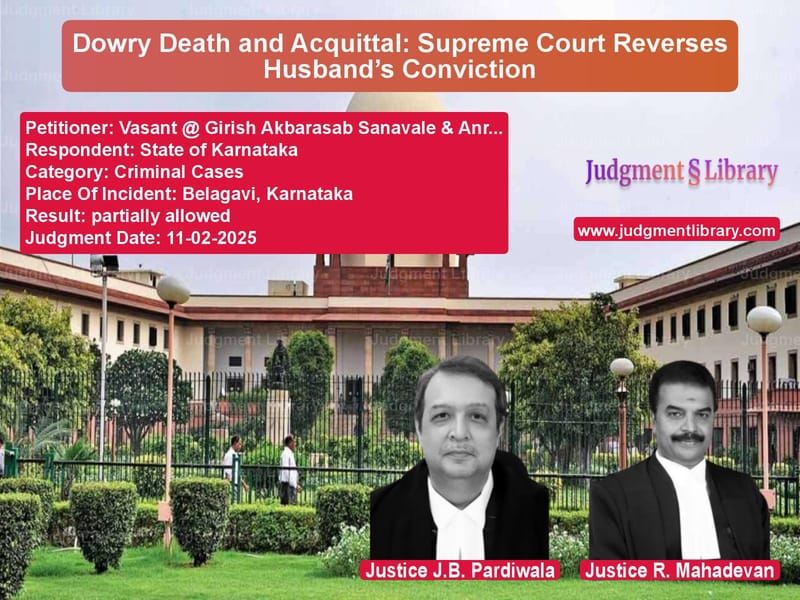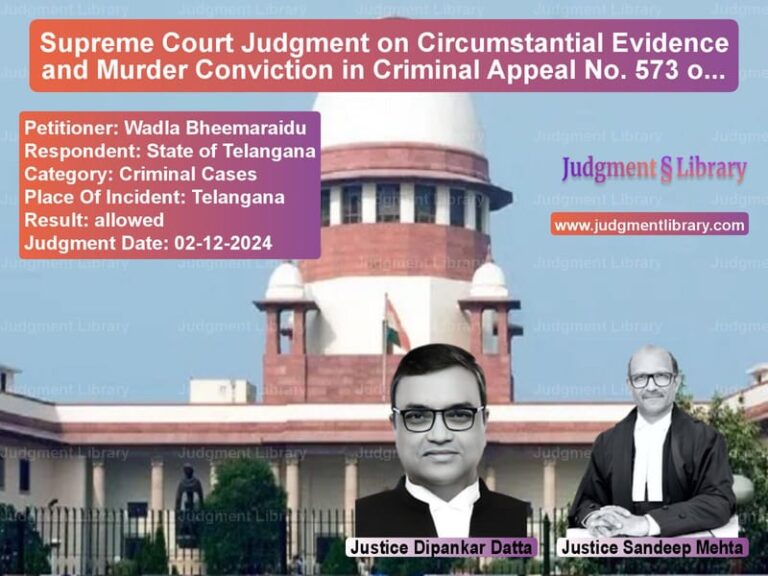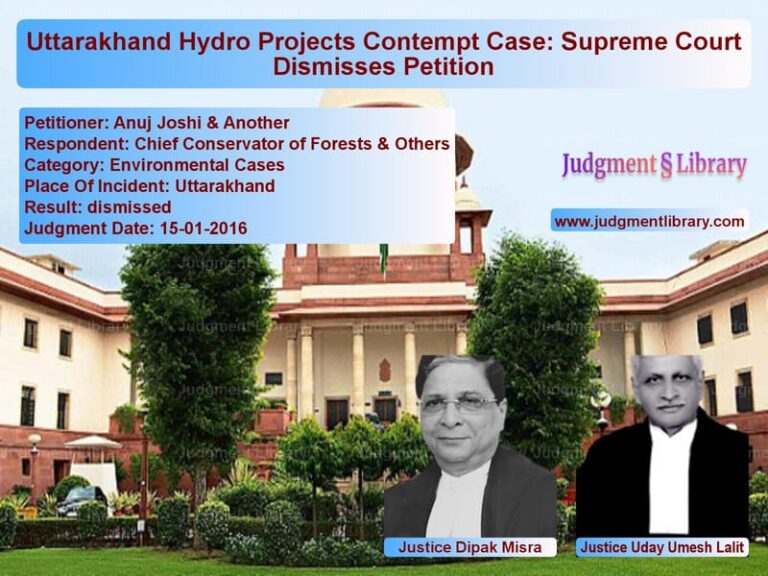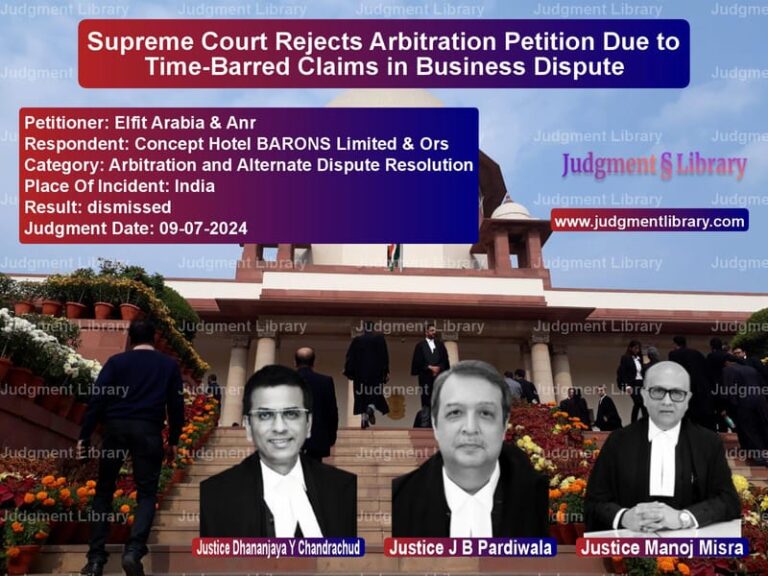Dowry Death and Acquittal: Supreme Court Reverses Husband’s Conviction
The case of Vasant @ Girish Akbarasab Sanavale & Anr. vs. State of Karnataka is a tragic and legally significant case involving allegations of dowry harassment and murder. The Supreme Court of India had to determine the culpability of the accused – the husband and the mother-in-law – in the burning death of the deceased, Geetha. The case raises crucial legal questions about the weight of dying declarations, the application of Section 34 IPC (common intention), and the presumption of guilt in domestic violence cases.
Background of the Case
The prosecution alleged that Geetha was married to Vasant @ Girish Akbarasab Sanavale (Appellant No.1) for eight years before the tragic incident occurred. The couple had three children. The prosecution claimed that Geetha faced continuous harassment from her husband and in-laws for dowry. On the night of the incident, her mother-in-law allegedly poured kerosene on her and set her on fire.
Neighbors rushed to the house and transported Geetha to the hospital. She survived for a week but ultimately died due to burn injuries. Before her death, a dying declaration was recorded, in which she blamed her mother-in-law for setting her on fire. However, her statement also mentioned that her husband tried to extinguish the fire.
Legal Proceedings
Filing of the FIR and Chargesheet
Following Geetha’s death, her mother filed an FIR on January 3, 2013, at the Mudalagi Police Station. The FIR accused Geetha’s husband, mother-in-law, and father-in-law of physically and mentally harassing her, pressuring her for a dowry of Rs. 5,000, and ultimately setting her on fire.
The prosecution filed a charge sheet under:
- Sections 498A, 302, and 504 IPC (harassment, murder, and intentional insult)
- Sections 3 and 4 of the Dowry Prohibition Act (demanding dowry)
Trial Court’s Judgment
The Sessions Court examined multiple witnesses, including neighbors and medical professionals, and analyzed evidence such as forensic reports and the dying declaration. The key findings of the trial court included:
- The prosecution failed to prove the allegations beyond a reasonable doubt.
- The dying declaration was recorded, but there were doubts about Geetha’s condition when she gave it.
- Many prosecution witnesses, including neighbors, turned hostile and did not support the prosecution’s claims.
- Ultimately, both accused were acquitted due to a lack of evidence.
High Court’s Decision
The State of Karnataka appealed the acquittal to the Karnataka High Court. The High Court reversed the acquittal and:
- Convicted both accused for murder under Section 302 IPC.
- Sentenced them to life imprisonment.
- Relied heavily on the dying declaration and concluded that both accused shared a common intention to kill Geetha.
Appeal Before the Supreme Court
The accused challenged the High Court’s decision in the Supreme Court. Their arguments were as follows:
Petitioners’ Arguments
The defense, led by senior counsel Faeek-ul-Farooq, contended that:
- The High Court wrongly reversed the well-reasoned acquittal by the trial court.
- Even if two views were possible, the High Court should not have interfered with the acquittal unless the trial court’s findings were perverse.
- The dying declaration was unreliable because the deceased was in critical condition and not mentally fit to make a coherent statement.
- There was no evidence against the husband (Appellant No.1), as the deceased did not blame him directly.
- In fact, the dying declaration stated that the husband tried to extinguish the fire.
Respondent’s Arguments
The State, represented by counsel Mr. Singhvi, argued that:
- The High Court correctly convicted the accused based on the dying declaration.
- The mother-in-law was directly named as the perpetrator in the declaration.
- Even if the husband did not actively participate, he was present at the crime scene and failed to take immediate action, which indicates common intention under Section 34 IPC.
- The husband should have provided an explanation under Section 106 of the Evidence Act regarding what transpired in the house.
Supreme Court’s Observations
The Supreme Court closely examined the case, focusing on the dying declaration, the role of the accused, and the concept of common intention. The key observations were:
- Reliability of the Dying Declaration: The Court noted that the dying declaration was recorded by a Tehsildar and confirmed by medical professionals. However, it only implicated the mother-in-law, not the husband.
- No Direct Role of Husband: The Court found that the prosecution failed to establish a common intention between the husband and his mother. The husband’s act of splashing water on Geetha contradicted claims of his complicity.
- Presumption Under Section 106 of Evidence Act: The Court ruled that merely being present at the crime scene did not shift the burden of proof onto the husband.
- Erroneous Conviction by High Court: The Supreme Court criticized the High Court’s assumption that the husband shared his mother’s intent.
Final Judgment
The Supreme Court delivered a split verdict:
- The conviction of the mother-in-law was upheld.
- The husband was acquitted as there was no substantial evidence against him.
- The husband was ordered to be released immediately if he was not required in any other case.
The Supreme Court concluded:
“There is no cogent and reliable evidence to hold the husband guilty of the alleged offense even with the aid of Section 34 of the IPC.”
Conclusion
This case highlights the complexity of dowry-related offenses and the necessity of solid evidence to convict an accused. The Supreme Court’s ruling reinforces the principle that suspicion, no matter how strong, cannot replace proof beyond reasonable doubt. While the mother-in-law was found guilty, the acquittal of the husband serves as a reminder of the importance of individual liability in criminal cases.
Petitioner Name: Vasant @ Girish Akbarasab Sanavale & Anr..Respondent Name: State of Karnataka.Judgment By: Justice J.B. Pardiwala, Justice R. Mahadevan.Place Of Incident: Belagavi, Karnataka.Judgment Date: 11-02-2025.
Don’t miss out on the full details! Download the complete judgment in PDF format below and gain valuable insights instantly!
Download Judgment: vasant-@-girish-akba-vs-state-of-karnataka-supreme-court-of-india-judgment-dated-11-02-2025.pdf
Directly Download Judgment: Directly download this Judgment
See all petitions in Dowry Cases
See all petitions in Murder Cases
See all petitions in Judgment by J.B. Pardiwala
See all petitions in Judgment by R. Mahadevan
See all petitions in partially allowed
See all petitions in supreme court of India judgments February 2025
See all petitions in 2025 judgments
See all posts in Criminal Cases Category
See all allowed petitions in Criminal Cases Category
See all Dismissed petitions in Criminal Cases Category
See all partially allowed petitions in Criminal Cases Category







